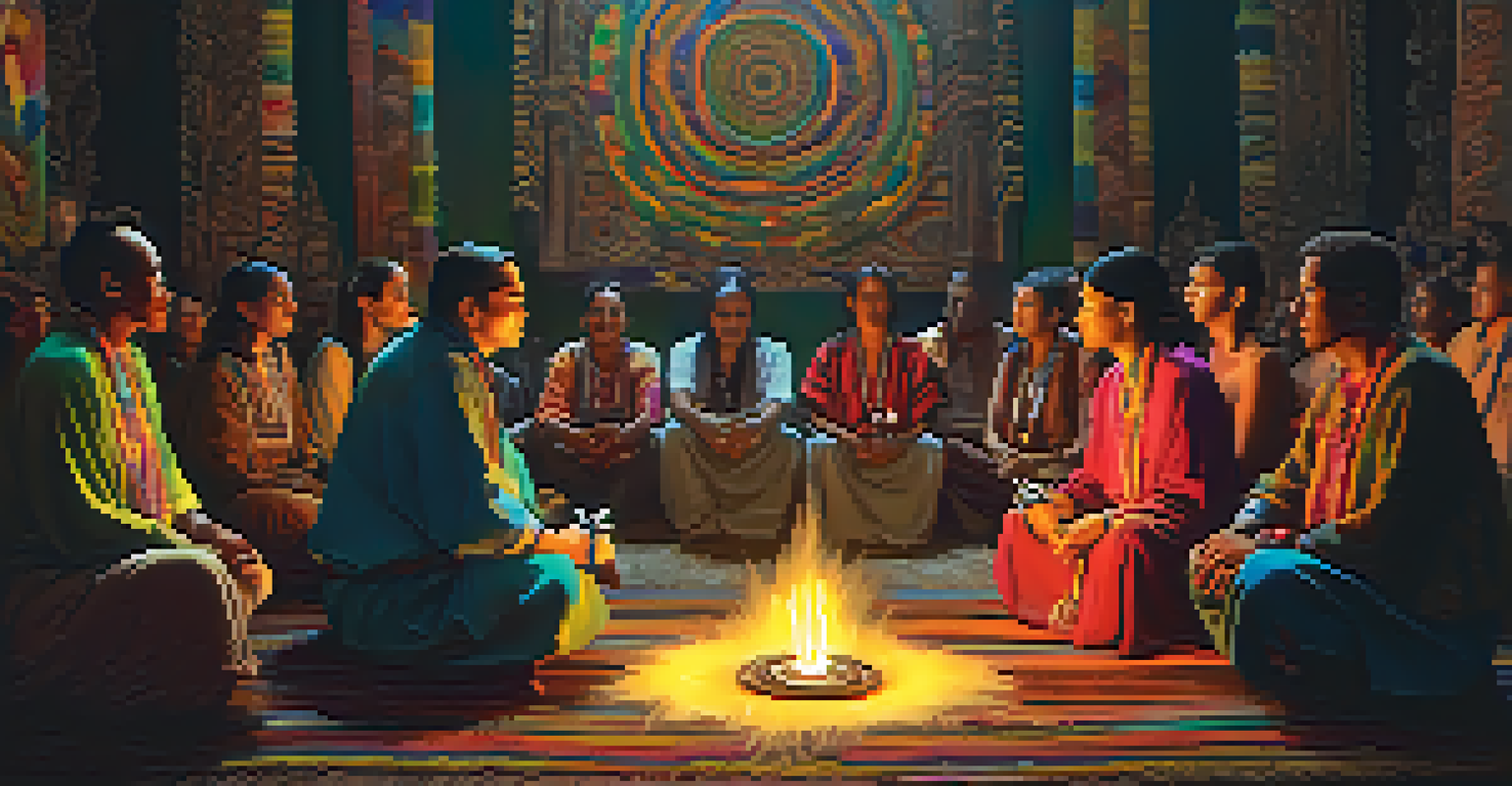Understanding Ayahuasca: A Path to Healing Mental Disorders

What is Ayahuasca and Its Cultural Significance?
Ayahuasca is a traditional brew made from the Banisteriopsis caapi vine and other plants, primarily used in Amazonian shamanic practices. This sacred drink has been utilized for centuries by indigenous tribes for spiritual and medicinal purposes. It’s not just a drink; it's a profound cultural symbol that represents a connection to ancestry and nature.
Ayahuasca can show you how to navigate the intricate pathways of your mind, illuminating the shadows that often go unnoticed.
The ritual of consuming Ayahuasca often involves a shaman, who guides participants through their experience, facilitating a journey that can reveal deep insights into one’s psyche. This communal aspect fosters a sense of belonging and support, which can be incredibly healing in itself. Ayahuasca is often seen as a doorway to understanding one’s place in the universe.
With its rise in popularity outside of South America, many are now seeking Ayahuasca for various mental health challenges, including depression and anxiety. However, it’s crucial to approach this powerful substance with respect, understanding its cultural roots and the importance of proper guidance during the experience.
How Does Ayahuasca Work in the Brain?
The primary psychoactive component in Ayahuasca is DMT (dimethyltryptamine), which can induce intense visual and emotional experiences. When consumed, DMT interacts with serotonin receptors in the brain, which can lead to altered states of consciousness. This is where the magic happens; these altered states can help individuals confront their fears and traumas in a safe space.

Research suggests that Ayahuasca may promote neuroplasticity, allowing the brain to form new connections and pathways. This is particularly beneficial for those suffering from mental disorders, as it can facilitate new ways of thinking and behaving. Imagine your brain like a well-trodden path in the woods; Ayahuasca can help carve out new paths, leading to healthier patterns.
Ayahuasca's Cultural Roots
Ayahuasca is a traditional brew used in Amazonian shamanic practices, symbolizing a deep connection to ancestry and nature.
Moreover, the experience often brings about emotional catharsis, enabling participants to release pent-up emotions and unresolved issues. This process can lead to profound healing, as individuals gain insights and a deeper understanding of themselves, paving the way for recovery and growth.
Potential Benefits of Ayahuasca for Mental Health
Many individuals report significant improvements in their mental health after participating in Ayahuasca ceremonies. These benefits can include reduced symptoms of anxiety and depression, enhanced emotional resilience, and a greater sense of peace. It's as if Ayahuasca offers a reset button for the mind, allowing users to emerge with a fresh perspective on life.
The journey of self-discovery is not a solitary path; it is a communal experience that fosters connection and healing.
One of the most compelling aspects of Ayahuasca is its ability to foster emotional healing. Participants often describe feeling a profound sense of connection to themselves and the world around them. This can lead to breakthroughs in understanding, allowing individuals to process trauma and grief that may have been buried for years.
Moreover, studies have shown that the use of Ayahuasca can lead to lasting changes in mental health, with many participants experiencing long-term relief from symptoms. This suggests that the benefits of Ayahuasca extend beyond the ceremony itself, potentially offering a new path toward sustainable mental well-being.
Risks and Considerations of Ayahuasca Use
While Ayahuasca can offer many benefits, it’s not without risks. Individuals with certain mental health conditions, particularly those with a history of psychosis, may experience adverse effects. It’s essential to approach Ayahuasca with caution, ensuring that it’s a suitable option for your unique circumstances.
Additionally, the setting in which Ayahuasca is consumed plays a critical role in the experience. A safe, supportive environment with a knowledgeable facilitator can make a significant difference in the outcomes. Imagine trying to navigate through a dense fog; having a guide can help illuminate the path ahead.
Mental Health Benefits
Participants often report significant improvements in mental health, including reduced anxiety and a greater sense of peace after Ayahuasca ceremonies.
Furthermore, there may be physical side effects, such as nausea and vomiting, which are often considered a part of the purging process. It’s vital to prepare mentally and physically for the experience, as well as to seek out reputable practitioners who prioritize safety and well-being.
The Role of Integration After Ayahuasca Experiences
Integration is the process of incorporating insights gained during an Ayahuasca ceremony into everyday life. This step is crucial, as it helps individuals make sense of their experiences and apply newfound knowledge to their daily routines. Without proper integration, the lessons learned may fade away over time.
Many participants find it beneficial to engage in therapy or support groups after their ceremonies. Sharing experiences with others who have undergone similar journeys can provide a sense of community and understanding. Think of it as sharing a dream with a friend; discussing it can help you grasp its meaning more fully.
Practices such as journaling, meditation, or therapy can also enhance the integration process. By actively reflecting on the experience, individuals can solidify their insights and foster lasting change, allowing Ayahuasca to serve as a catalyst for ongoing personal growth.
Finding a Safe and Ethical Ayahuasca Retreat
Choosing the right Ayahuasca retreat is essential for a safe and beneficial experience. It's important to research the retreat center thoroughly, looking for reviews and testimonials from past participants. A reputable center will prioritize safety, ethics, and the well-being of its guests.
Inquire about the qualifications of the facilitators and shamans leading the ceremonies. They should have extensive experience and a deep understanding of the tradition and the brew itself. Think of it like finding a good doctor; you want someone who is knowledgeable and compassionate.
Integration is Key
The process of integrating insights gained from Ayahuasca experiences into daily life is essential for lasting personal growth and healing.
Additionally, be mindful of the retreat's approach to integration and aftercare. A responsible retreat will offer support and resources to help participants process their experiences. This ongoing care is vital for ensuring that the journey with Ayahuasca is not just a one-time event, but a meaningful step toward lasting healing.
Personal Stories: Transformative Experiences with Ayahuasca
Many individuals have shared transformative stories about their journeys with Ayahuasca. For some, it has meant a profound release from the grip of depression, allowing them to reclaim their joy and purpose in life. These narratives often highlight the power of connection, both to oneself and to others during the ceremonies.
Others have experienced a deep sense of clarity and insight that has changed their life paths. One participant described Ayahuasca as a mirror, reflecting their true self back to them, which prompted a reevaluation of their values and priorities. This powerful metaphor illustrates how Ayahuasca can illuminate even the darkest corners of the mind.

The healing power of Ayahuasca is not just about individual experiences; it can also foster a sense of community among participants. Sharing these journeys can lead to lasting friendships and support networks, emphasizing the importance of connection in the healing process.